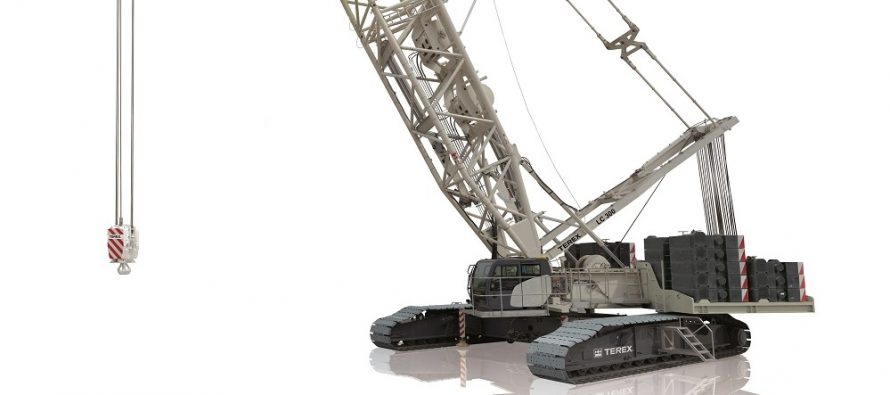New Terex LC 300 crawler crane delivers high lift capacities in a design that improves operating efficiency

Related Articles
Terex Cranes introduces the new Terex LC 300 lattice boom crawler crane, offering contractors high lift capacities in a design that is efficiently transported to the project site and quickly ready for work. In North America, the crane will be available as the LC 330US.
Offering a 300-ton maximum lift capacity and impressive 1,810 mt maximum load moment, the new LC 300 crane is the largest crawler crane in this product range. For contractors operating in the heavy civil infrastructure – especially bridge construction – Petrochemical, power plant and wind turbine industries, this new Terex crane delivers power, flexibility and options for efficiently completing projects on schedule.
The LC 300 crawler crane boasts the new Terex-exclusive counterweight tray design which consists in 2 stacks on each side instead of a single stack. This reduces counterweight stack height, lowers the crane’s center of gravity with no need for central ballast and improves counterweight assembly efficiency (the required lifting capacity of the assist crane is 10t only). Crew members can quickly adjust front/rear stack height to address counterweight needs based on boom configuration and according to the load charts.
“The new LC 300 crawler crane design grew out of our global Product Design and Manufacturing Strategy to consistently implement the Terex product quality and safety standards. Product engineering, manufacturing and supply chain team members from our Jinan, China and Zweibrücken, Germany locations worked together throughout the product development process,” says Guntram Jakobs, Manager Product Marketing for Terex Cranes. The new model will be manufactured in our Jinan facility. “Delivering excellent capacities in main boom, fixed and luffing jibs and tip extension configurations, the LC 300 crane will help our customers complete their projects efficiently, and with great lifting flexibility. ”
Efficient Set-up and Transporting
Self-assembly of the LC 300 crane’s crawler tracks substantially helps to achieve short rigging time. It can be configured with up to 84 m of main boom or up to 60 m of main boom with a 72 m luffing jib for a total maximum system length of 132 m. Standard assembly remote control increases rigging ease, and is equipped with the Terex fall protection system for safe boom assembly and disassembly. For further reduction of set up time and expense the main boom can be rigged “free in the air” with up to 54 m main boom without assist crane.
Terex Cranes’ slide-in system for the main boom sections more efficiently utilizes truck payload to reduce transportation costs and time. Transported without restrictions on a standard lowboy or drop-deck trailer, the smaller boom sections are designed to easily be placed inside larger ones for moving to the project site. Lifting lugs located on the lower main cords of the boom section improve boom loading efficiency and reduce work at height. For making more efficient use of available ground space in congested sites, available stacking blocks provide safe, quick and easy stacking of boom sections.
The new LC 300 crawler crane includes many of the features contractors worldwide have come to expect from Terex Cranes to increase operating uptime and efficiency. For efficient use of counterweight inventory, the LC 300 crane’s counterweight slabs are interchangeable with Terex and Demag lattice boom cranes in operation since 1998 and Demag all terrain crane models starting with the AC 500 and higher. Efficient maintenance intervals limit service time to increase crane utilization rates. The wide Terex cabin offers enough room to comfortably fit a second operator. Two operating screens – one displaying engine, winches and crane settings; and a second showing the IC-1 Load Moment Indicator – offer intuitive crane operation to improve operator’s productivity.







